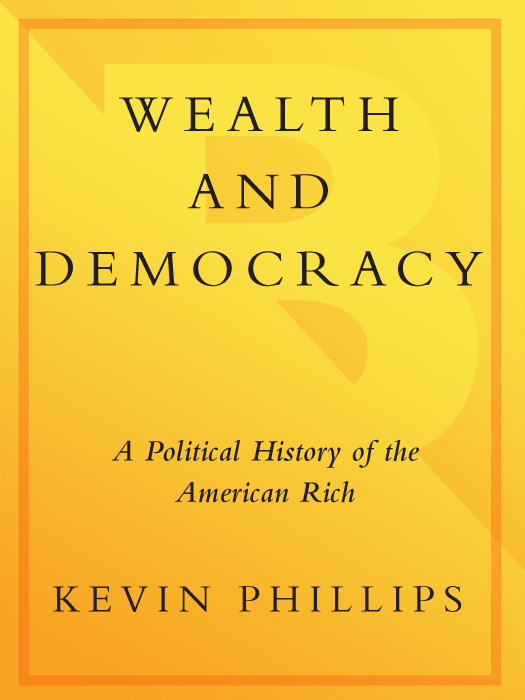
Wealth and Democracy
How Great Fortunes and Government Created America's Aristocracy
کتاب های مرتبط
- اطلاعات
- نقد و بررسی
- دیدگاه کاربران
نقد و بررسی

Starred review from April 22, 2002
The influence of money on government is now, more then ever, a hot political issue. With a grand historical sweep that covers more than three centuries, Phillips's astute analysis of the effects of wealth and capital upon democracy is both eye-opening and disturbing. While his main thrust is an examination of "the increasing reliance of the American economy on finance," Phillips weaves a far wider, nuanced tapestry. Carefully building his arguments with telling detail (the growth of investment capitalism in Elizabethan England was essentially the result of privateering and piracy) and statistical evidence, he charts a long, exceptionally complicated history of interplay between governance and the accumulation of wealth. Explicating late-20th-century U.S. capitalism, for instance, by drawing comparisons to the technological advances and ensuing changes in commerce in the Renaissance, he also discusses how 18th-century Spanish colonialism is relevant to how "lending power began to erode... broad prosperity" in 1960s and '70s America. Finding detailed correspondences between the giddy greediness of America's Gilded Age (complete with a surprising quote from Walt Whitman—"my theory includes riches and the getting of riches") and the "great technology mania and bubble of the 1990s," Phillips (The Cousins' War,
etc.), noted NPR political analyst, notes that "the imbalance of wealth and democracy in the United States is unsustainable," as it was in highly nationalistic mid-18th-century Holland and late-19th-century Britain—both of which underwent major social and political upheaval from the middle and underclasses. Lucidly written, scrupulously argued and culturally wide-ranging, this is an important and deeply original analysis of U.S. history and economics. (May 14)Forecast:Filled with tables and graphs and a rather dense text, this may be more talked-about than read, but talked-about it will be by commentators and pundits.

November 1, 2001
Political analyst Phillips (The Politics of Rich and Poor) argues that the accumulated wealth of America's best-off families is a challenge to democracy.
Copyright 2001 Library Journal, LLC Used with permission.

May 1, 2002
Phillips' " The Politics of Rich and Poor" (1990) detailed wealth concentration and policy favoritism under the Reagan administration. His new book takes a much broader approach by detailing the historical account of the relationships between politics and wealth in the U.S. He relates how the disparity between rich and poor correlates with our propensity for speculative excess and technology manias and the corruption of government throughout this nation's history. He points out that real, after-tax income for average workers peaked in the late 1960s, while the amount of wealth concentrated in the upper one precent has steadily increased. This trend reflects similar boom-time eras as the Gilded Age (1870-90) and the 1920s. As this gap widens, Phillips warns that we may be in a late-stage economic period similar to that of three previous leading economic powers: Britain, the Netherlands, and the earlier Spanish Hapsburg empire. The figures on the financial worth of famous American aristocrats through the years are impressive.(Reprinted with permission of Booklist, copyright 2002, American Library Association.)

























دیدگاه کاربران